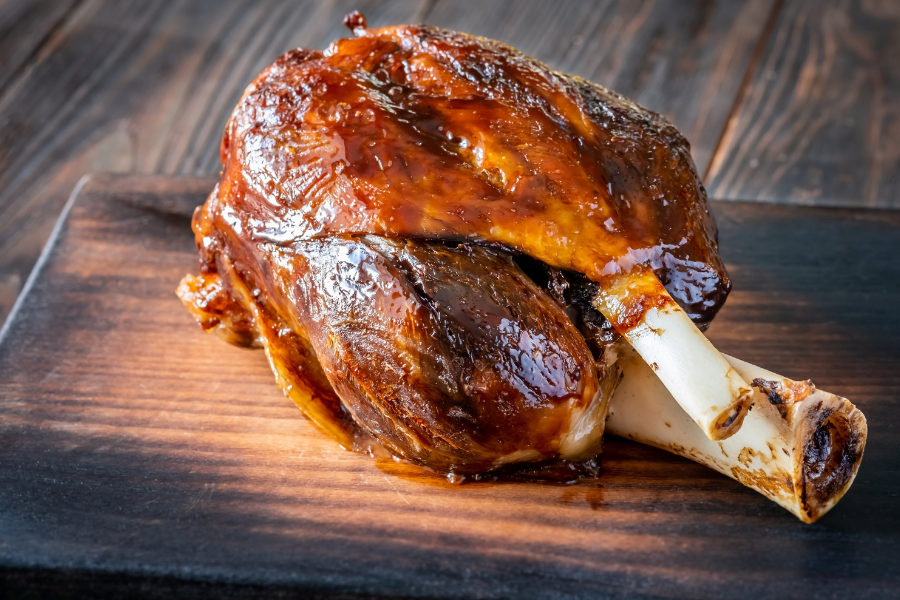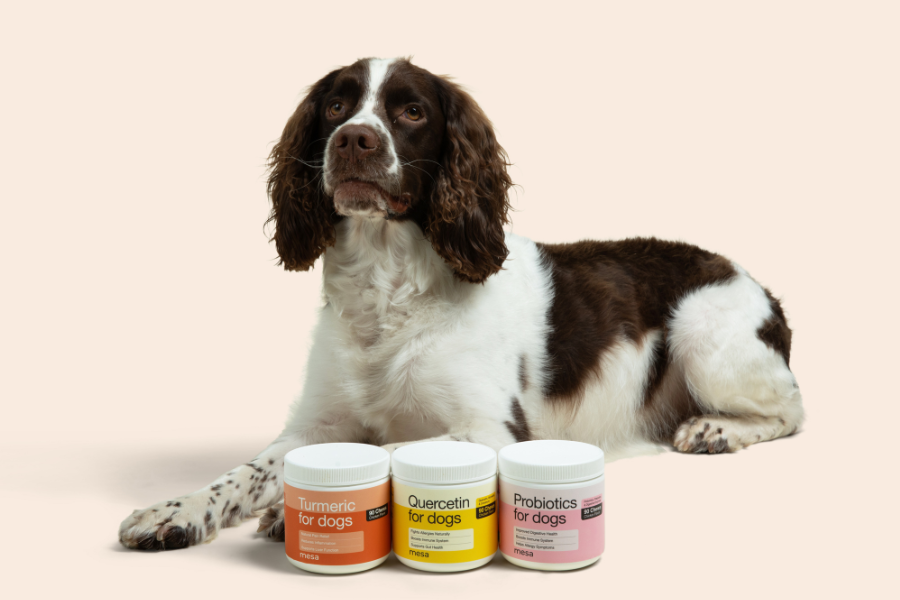Hey there, fellow dog moms and dads, has your fur baby ever given you that look during dinner time? You know the one. Those big, irresistible puppy eyes and the over-the-top sniffing. We get it, it's almost impossible to resist slipping them a little something from your plate, especially when you've got a juicy ham bone leftover. But, hang on a sec, should the fur kiddos really be chomping on ham bones?
Wham, bam, thank you, ham? Not so fast.
It's not as simple as a yes or no. That festive ham bone might look like an awesome treat for your four-legged family member, but there are some risks that us pet parents need to be aware of. But don't stress—we're here to lay it all out for you in a way that'll get your tail wagging.
Are Ham Bones Safe for Dogs?
Short answer? Not really.
Now, we know what you're thinking—bones are basically doggy chew toys from nature, right? Especially those tasty ham bones! But hold up there, friend. Turns out, these aren't as great for your four-legged buddies as you'd think. Here's the lowdown:
1) The Splinter Hazard
Did you know that most ham bones are cooked, which makes them kinda brittle? Imagine Fido chomping down, and poof! The bone splinters into sharp pieces. Nobody wants to be rushing to the vet because our furry friend got a bit too enthusiastic about his snack.
2) The Umm... Digestive ‘Block Party’
Even if your pooch successfully crunches the bone down to size, those tiny pieces can get stuck somewhere they really shouldn't. We’re talking about nasty blockages in the stomach or intestines that can lead to vomiting, constipation, or even life-threatening complications. Yikes!
3) The Salt-n-Fat Overload
We all love a good ham (including our dogs). But, ham is jam-packed with salt and fat, and sadly, a dog's stomach isn't built for that kind of party. Too much salt can cause dehydration or even sodium ion poisoning (chicken may be better if you want to share your dinner), while the fats could lead to pancreatitis—inflammation of the pancreas that's as nasty as it sounds.
4) Bacteria and Preservatives, Oh My!
You know how the ham sits out all day during family dinners? Yeah, not great for Rover. Plus, store-bought ham often has things like nitrates and fancy seasonings that are a no-go for dogs. Sure, garlic, onion powder, and certain spices might elevate your ham, but they're pretty toxic for dogs.
What About Raw Ham Bones?
So, we've established that cooked ham bones are a no-go. But hang on, what about raw ones, you ask?
Generally, raw bones tend to splinter less than their cooked counterparts, and some dog owners even call them the ultimate pup treat! However, even these raw ham bones can come with their fair share of troubles. They come from pork, and pork bones—raw or cooked, doesn't really matter—are known to break easily. So they're not quite the greatest choice when compared with robust dudes like beef marrow bones.
Plus, raw bones can be stowaways for nasty bacteria like salmonella or E. coli. These unwanted tag-alongs can cause pretty serious illnesses for both your four-legged pal and anyone getting handsy with the bone. If you're tossing around the idea of giving your dog raw bones, it's super important to have a chat with your vet first. Trust us, they really know what they're talking about.
What Are the Risks of Giving My Dog a Ham Bone?
To summarize, here are the potential dangers of giving your pup a ham bone:
- Mouth and throat injuries: Splintered bone pieces could cut your dog’s gums, tongue, or throat.
- Choking hazard: Bone shards can easily get stuck in your dog’s airway.
- Internal damage: Splinters can puncture your dog’s stomach or intestines, leading to internal bleeding.
- Blockages: Bone fragments can cause severe digestive issues that might require surgery.
- Toxicity: Seasonings, preservatives, and excess fats in ham can lead to poisoning or pancreatitis.
- Bacterial contamination: Raw ham bones may harbor dangerous bacteria like salmonella or E. coli.
The risks are significant enough that most veterinarians recommend steering clear of bones altogether when it comes to your dog’s diet.
Safer Alternatives to Ham Bones
Good news, though—just because ham bones aren’t safe doesn’t mean you can’t treat your dog to something delicious and chewable! There are plenty of safe alternatives out there that will satisfy your pup’s chewing instincts without putting their health at risk.
Dental Chews
For all those chew-obsessed dogs out there, dental chews are the way to go. They not only quench that chew-thirst but also keep their pearly whites gleaming. That's what we call a win-win!
Rocking Rubber Chew Toys
Who said KONGs are only for kids? These tough rubber chew toys are the ultimate boredom busters that also keep your dog's teeth safe. Bonus points for stuffing them with dog-friendly peanut butter or treats. Yum!
Not-Your-Regular Rawhide
Who needs rawhide when you have dog chews made from awesome stuff like sweet potato or beef tendon? These chews not only switch up the flavor game, but they're also way safer since they break down easily in your pup's tummy.
Au Naturel Dog Chews
On the hunt for something more natural? Check out turmeric chews, bully sticks or dehydrated fish-skin chews. They're the safer alternatives to bones and still hit that chew satisfaction spot!
Chilled Carrot Sticks
And for a snappy, healthy alternative - look no further than frozen carrot sticks. They're a low-calorie, nutrient-loaded treat that's also a perfect way to cool down your pup on a hot day.
How to Keep Mealtime Safe for Your Dog
If you’re feeling guilty about turning down those puppy-dog eyes during dinner, don’t worry. Here are a few tips to make mealtime safe and enjoyable for your four-legged friend:
- Stick to dog-specific treats - Instead of table scraps, offer your dog their favorite treat or chew. Your pup will love it just as much!
- Keep bones out of reach - Make sure leftover bones are disposed of properly to avoid any sneaky grab-and-chew attempts.
- Watch for signs of trouble - If your dog has managed to snag a ham bone, watch for warning signs like choking, vomiting, or lethargy, and contact your vet immediately.
Final Verdict
Dogs may love bones, but not all bones love dogs back—especially ham bones. The risks far outweigh the benefits when it comes to treating your pup with a ham bone, whether cooked or raw.
But don’t sweat it! We've got plenty of of doggy-friendly alternatives that'll keep your pup prancing with joy, not to mention healthy as a horse. If you're ever scratching your head about what's best for your dog, the vet's got your back.
Got something on your mind about your pup's nutrition? Send us a note!
FAQs
Can my dog have any type of bone?
While some raw bones, like beef or lamb bones, may be safer than cooked bones, they still come with risks such as splintering or causing intestinal blockages. Always check with your vet before giving your dog any type of bone.
Why are cooked bones dangerous for dogs?
Cooked bones, including ham bones, can easily splinter and break. This can lead to severe injuries like choking, mouth injuries, or even punctures in your dog’s digestive system.
What are some safe alternatives to bones?
There are plenty of dog-approved alternatives, such as rubber chew toys, dental chews, and specially made edible dog treats. These options are designed for your pup’s safety and enjoyment!
How do I know if my dog swallowed a harmful bone?
Watch for symptoms like vomiting, diarrhea, decreased appetite, lethargy, or signs of pain. If you notice any of these, contact your vet immediately for advice or treatment.
Can I give my dog a ham bone if it's a special occasion?
Even for special occasions, ham bones are not safe due to the risks they pose. Celebrate with dog-friendly treats instead, such as a peanut butter-filled toy or a vet-approved treat.
References
1) VCA Animal Hospitals. (n.d.). Why bones are not safe for dogs. Retrieved January 8, 2025, from https://vcahospitals.com/know-your-pet/why-bones-are-not-safe-for-dogs



